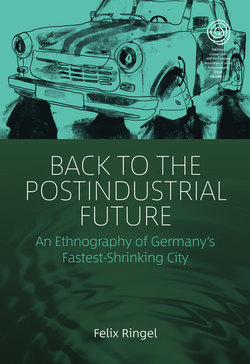Читать книгу Back to the Postindustrial Future - Felix Ringel - Страница 26
На сайте Литреса книга снята с продажи.
Marxism as/in Context
ОглавлениеMarxism could be one of the overarching perspectives as well as a good strategy to repoliticize Hoyerswerda’s current changes. Interestingly, Marxism rather than, for instance, ‘postsocialism’ was actually often invoked in my fieldsite, despite being generally devalued in German political discourses. In Hoyerswerda, Marx himself was often accused of having made an anthropological mistake, namely, misunderstanding that the human being, as it were, ‘is not made for socialism’ (nicht für den Sozialismus gemacht). However, even his own otherwise convincing narrative of history as class struggle seems hard to deploy. Once we dissolve the metacontext of historical materialism and class exploitation, again, into the actual social context at place, it gains, if anything, unexpected explanatory value.
On a class trip in July 2008, eighteen-year-old Willy and some of his classmates had a passionate discussion about the Communist Manifesto. Willy had bought a cheap paperback version of the Manifesto because of his interest in leftist theory. In a long debate, the application of its insights to their hometown’s current problems proved more difficult than expected. No classes to be easily identified; only the ever-looming confrontation with the big historical disproval of actually existing socialism: its own failure. Instead of problematizing their hometown’s present, Marx’s text made this group of young anarchists reconsider the GDR, a country most of them were just about born into, as yet another ideological project in world history. This project of socialist modernity was as ‘unfree’ and ‘oppressive’ as any other ideological project, such as contemporary global capitalism. The context, in which their hometown gained so much prominence, was thus put in another temporal frame (anarchist if you wish), which in turn devalued Marxism as a context to think with.
